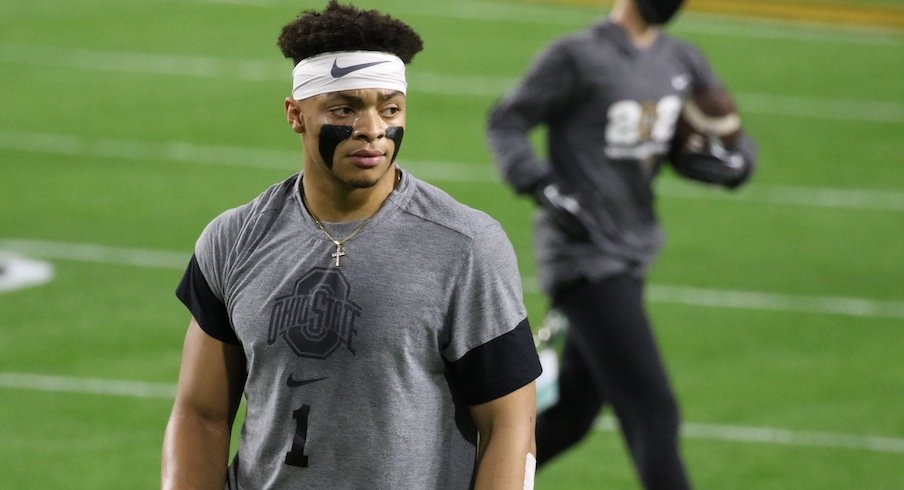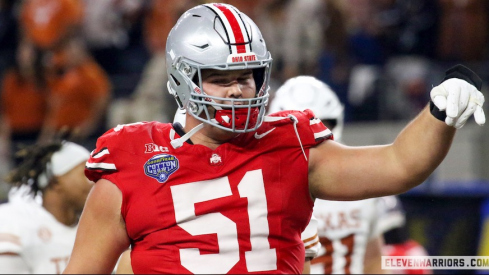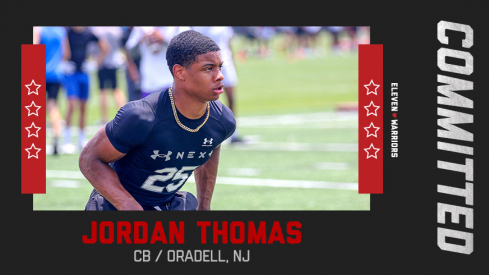While it didn’t become public information until one week before the NFL draft, Justin Fields has known he has epilepsy since he was in the ninth grade.
One day after the former Ohio State quarterback was selected by the Chicago Bears with the No. 11 overall pick in the 2021 NFL draft, he spoke publicly about that condition for the first time.
“So basically, I had a seizure in school, and it was crazy, because I just woke up in an ambulance,” Fields said Friday. “It was definitely a crazy story for me.”
The revelation that Fields had epilepsy, which was reported by NFL Network’s Ian Rapoport and Tom Pelissero just eight days before the draft, came as a shock to many, as his diagnosis had never previously been disclosed to the public.
Fields had chosen to keep that information private. But he says he’s not bothered by the fact that people know about it now.
“It is what it is,” Fields said. “It’s a part of me. I’m not gonna try to hide it. It’s who I am. So there’s no real reason to try to hide it.
“So it’s really nothing different for me, and of course it came from a leaked source, but I’m not worried about that one bit, so I’m just happy to be here.”
Really, there just wasn’t any reason for Fields to talk about it for the past seven years, because it’s had no impact on his ability to play football. Since he’s been diagnosed, Fields has taken medication to manage the condition – which affects more than 3 million Americans according to the CDC – and it never stopped him from becoming the No. 2 overall recruit in his class or becoming one of college football’s elite players during his two years at Ohio State, in which he never missed a game.
“It has had zero effect on football,” Fields said. “I haven’t missed any practices, any games because of it and it’s pretty simple for me to manage it. I just have to take 3-4 pills a night every night, so it’s nothing crazy. It’s kind of a thing that’s been there for the past seven or eight or so years, so I’m used to it, and I’m just gonna continue to deal with it and continue to play the game I love.”
Ohio State coach Ryan Day and offensive coordinator Kevin Wilson both said that while they were aware of Fields’ condition, it wasn’t something they ever had to worry about during his Ohio State career because he managed it properly and it never stopped him from being on the field.
“We were aware of it, but Justin was very professional and mature about it,” Day said. “He took his medicine, and we never had an issue.”
While conditions like epilepsy often tend to be stigmatized, there are many other examples of athletes being diagnosed with the disorder and continuing to compete, including Pro Football Hall of Fame guard Alan Faneca, who has been open about his own experiences with epilepsy in hopes of breaking that stigma.
If I did it, so can @justnfields, and so can anyone else. It is part of us, but does not define us! #epilepsy #neverstopdreaming https://t.co/4DeAx5g3Dk
— Alan Faneca (@afan66) April 21, 2021
Bears general manager Ryan Pace said the team had no concerns about Fields’ diagnosis, which had already been disclosed to NFL teams before NFL Network’s report, in trading up for Fields and drafting him to be their quarterback of the future.
“We were very comfortable with that and how he handles that,” Pace said. “We’ve dealt with something similar in the past, with different players over the years, and we’re completely fine with it.”


